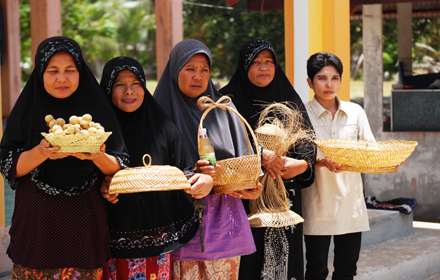Young entrepreneurs and the potential of Halal products in AEC
Unlike their peers of the old days, many college graduates, these days, do not find working in government service or in the private sector attractive or promising. They aspire to become entrepreneurs, be their own bosses and have their own businesses.

Simply put, these young men and women want to have their own brands of their products from their own ideas in the seemingly endless world of business. They don’t want to be just a small “bolt and nut” factory or an office and to rely on the monthly salaries to make a living, so said Dr Kumajdee Yameerudeng, assistant rector of Rajabhat Yala University.
The Rajabhat University has a project to train and develop young businessmen in the Deep South.
To begin with, Dr Kumajdee said that it is not easy to become a successful businessman or businesswoman and, also, it is not impossible to become one. The point is the aspirants need to be trained and developed and he is willing to share his experiences.
The southern provinces, said Dr Kumajdee, are regarded as one of the gateways to Asean and also a gateway for Halal products.
He said he didn’t want to see the aspiring entrepreneurs to focus too much on the volume of the products they wish to sell but on the value of the products as priority.
To be a good or successful entrepreneur, Dr Kumajdee said the person must have at least two qualifications – firstly, the determination to learn and to become an entrepreneur and, secondly, his/her products or services must be of good quality.
No matter how qualified an entrepreneur is, if his/her products or services are of poor quality, nobody will want to buy the products or services, he explained.
To be a successful entrepreneur in Halal products, he said that the entrepreneur must look beyond the markets for Muslim people only but for non-Muslim markets as well. And Halal is not all about food alone but includes non-food products and services.
Halal products should not be confined to just Muslims but non-Muslims too but they must meet the quality standards set by an institute to certify Halal products.

Dr Kumajdee envisages the development of community-based enterprises to be capable of churning out Halal products or OTOP Halal products.
There are altogether 3,000 community-based enterprises and about 1,000 OTOPs which, he said, should be upgraded into small or medium-sized enterprises.
Universities can play an active role in the development of these enterprises through the provision of technical knowhow and information. Moreover, he said support from the government is crucial in rendering credibility to the products or services regardless whether they are Muslims or non-Muslims.
----------------------------------------------------------------------------------------------------------------
Captions :
1 OTOP Halal products
2 Dr Kumajdee Yameerudeng
